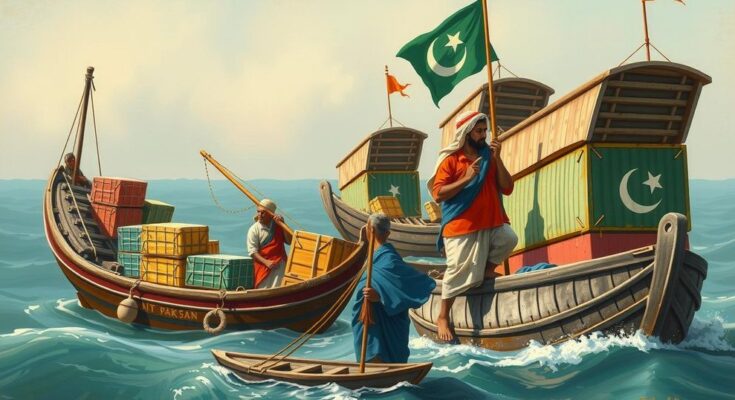Bangladesh has seen a strengthening of maritime and trade ties with Pakistan, highlighted by the arrival of the ‘MV Yuan Xiang Fa Zhan’ in Chittagong. This development follows meetings between interim leader Professor Muhammad Yunus and Prime Minister Shehbaz Sharif, aiming to enhance bilateral relations and address historical grievances since Bangladesh’s separation in 1971. The leaders expressed intentions to foster strategic partnership through increased trade and cultural exchanges.
In a notable shift in maritime relations, a second cargo vessel from Karachi has successfully made its way to Chittagong, marking a significant strengthening of trade ties between Pakistan and Bangladesh. The Panama-flagged vessel, ‘MV Yuan Xiang Fa Zhan,’ arrived on Sunday with a cargo of 811 containers that included essential industrial materials and consumer goods. This shipment follows Bangladesh’s interim leader, Professor Muhammad Yunus’s recent meeting with Pakistan’s Prime Minister Shehbaz Sharif in Cairo, where both nations expressed a desire to enhance bilateral relations.
Since assuming office in August, Professor Yunus has actively sought to repair ties with Pakistan, countering the pro-India approach of the previous administration. His government has prioritized establishing direct maritime connectivity, culminating in the arrival of the ‘MV Yuan Xian Fa Zhong’ from Karachi in November, which was the first direct maritime link between the two countries since Bangladesh’s independence. Mr. Yunus has held discussions with Prime Minister Sharif on multiple occasions, emphasizing the resolution of historical grievances stemming from the 1971 separation, which remains a sensitive topic.
In their recent meeting, Prime Minister Sharif referred to Bangladesh as a “brotherly country,” expressing optimism for a strategic partnership and reinforcing the commitment to advancing trade, commerce, and cultural exchange between the nations. This newfound maritime collaboration signals a pivotal moment in the relationship between these two historically intertwined countries, once part of the same nation.
The successful arrival of vessels suggests a transformation in trade dynamics and may indicate a shift away from dependency on Indian imports. As both nations navigate this changing landscape, the emphasis on improving ties may have profound implications for regional economic cooperation and diplomatic relations.
The recent strengthening of trade between Pakistan and Bangladesh marks a significant milestone in a relationship that has been historically fraught with tension following Bangladesh’s independence in 1971. The establishment of direct maritime links signifies a renewed willingness to engage in commerce and diplomacy. The strategic shift initiated by Bangladesh’s interim leader, Professor Muhammad Yunus, reflects a desire to amend the longstanding pro-India stance of the previous administration and cultivate a cooperative relationship with Pakistan.
The increasing maritime cooperation between Bangladesh and Pakistan represents a pivotal shift that could reshape trade dynamics in South Asia. With both governments expressing a commitment to resolving historical issues and improving bilateral relations, this development holds the potential for enhanced economic collaboration and cultural exchanges. The arrival of significant cargo shipments marks the beginning of a new era in the interactions between these two nations, which may benefit from this strategic partnership.
Original Source: indiashippingnews.com




